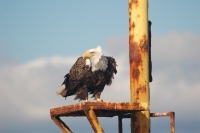
(Photo: Danielle Dion)
Bald Eagle
Haliaeetus leucocephalus
The bald eagle is a very large bird with a wingspan of 1.7 to 2.4 metres. It has a chocolate-brown body and wings, with white head and tail feathers and a hooked yellow beak.
Authority
Linnaeus, 1766
Classification Details
Phylum: Chordata (chordates); Subphylum: Vertebrata (vertebrates); Class: Aves (birds).
Habitat
Very common in North America. They nest in forested areas near the water.
Diet
Predators. Diet includes salmon, herring, other fish, smaller birds, reptiles, crabs, and rabbits. They use their strong talons for fishing. Bald eagles will steal fish from smaller birds. They harass small raptors (predatory birds) until they drop their food. They can also steal fish from the talons of another bird.
Reproduction
Sexes are separate. Males and females pair up and contribute to building a nest made of sticks in a tall conifer tree. The nests are very large: up to 1.8 metres in diameter and 1.2 metres tall. Eagles mate for life and usually return to the same nest site. The female lays one to three eggs between late February and mid-June. Eggs hatch after 34 to 36 days. Both parents care for the chicks. A parent broods the chicks until they are around four weeks old. Parents bring food and tear off small pieces for the chicks to eat. Fledglings leave the nest between eight and 14 weeks of age. Adults can live up to 28 years.
Fun Facts
In the 1960s, the bald eagle was in danger of extinction. Loss of nesting habitat, shooting for pest control, and exposure to the pesticide DDT, which made its eggshells so thin they broke when sat on, all contributed to its decline. Conservation measures such as banning DDT and prohibiting hunting have worked, and the species is now regarded as stable.
The eagle isn't featherless on its head: bald also means "marked with white" and refers to its colouring.
References
Audubon. Bald Eagle. https://www.audubon.org/field-guide/bird/bald-eagle Accessed online 20 January 2020. Buehler DA (2000) Bald Eagle (Haliaeetus leucocephalus), version 2.0. In The Birds of North America (A. F. Poole and F. B. Gill, Editors). Cornell Lab of Ornithology, Ithaca, NY, USA. https://doi.org/10.2173/bna.506

